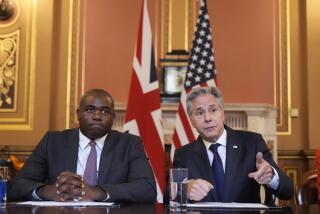U.S. Ambassador in Iraq Accuses Iran of Meddling
- Share via
BAGHDAD — In a scathing complaint about Washington’s longtime nemesis, the top U.S. diplomat here accused Iran on Monday of fomenting trouble in Iraq’s southern provinces by calling for the withdrawal of British troops.
Ambassador Zalmay Khalilzad suggested that Iran was focusing attention on Iraq in an attempt to distract the international community from Tehran’s nuclear program.
“It may be ... that the nuclear issue is getting more serious and difficult for Iran, [and] they’re trying to divert attention from that issue by getting themselves involved in things that are frankly none of their business,” Khalilzad told reporters during a briefing in Baghdad’s heavily fortified Green Zone. “I think their role has taken a negative turn.”
The diplomat accused Iran of providing weapons and training to militias in Iraq even as it labored to build friendly diplomatic relations with the government in Baghdad, which like the leadership in Tehran is dominated by Shiite Muslims. Iran’s double-edged policy is meant to nurture its goals of turning itself into a regional power, Khalilzad said.
The ambassador’s remarks were unusually sharp. In the past, American diplomats in Baghdad have generally avoided overt, public criticisms of Iran. Instead, they stuck to vague grumblings about “neighboring countries” and insisted that they did not expect Baghdad to replicate the frosty U.S. relations with Iran.
But Monday, the ambassador seemed primed to criticize Iran. A reporter asked about the Islamic Republic after U.S. Embassy staffers prodded journalists to raise the issue during a news conference given by Khalilzad.
“They’re using a variety of tools that to you and I would look very contradictory but to them is part of a comprehensive strategy,” Khalilzad said of Iranian officials. “We are increasingly worried about the role Iran is playing.”
Khalilzad also called on Iraq’s disparate political groups to come together and achieve a national unity government, saying that ethnic and sectarian “polarization” was “feeding the insurgency and creating a context for terrorism.” He criticized the Shiite-led government of interim Prime Minister Ibrahim Jafari, who was recently named his coalition’s nominee to continue as premier, as unreflective of the country’s political groups.
“The various communities of Iraq need to come together in a national compact,” he said. “We’ve spent a lot of blood and treasure here. We regard Iraq’s success to be our success. And God forbid, Iraq’s failure will also be ours.”
The harsher rhetoric toward Tehran comes as the standoff with the West over Iran’s nuclear ambitions continued.
Iran has asserted its right to nuclear technology, saying its goal is to produce power for civilian use. In the process, it has flirted with sanctions from an international community that fears Tehran wants to build a bomb. Iranian negotiators are in Moscow this week for talks on a proposal to jointly enrich uranium on Russian soil as a way of easing those concerns.
The ambassador’s remarks also came amid a war of words over the role of British troops in the southern city of Basra. A heavily Shiite Muslim city, Basra has close and ancient ties to the Shiite clerics who rule neighboring Iran. When video came to light this month showing British soldiers beating and kicking Iraqis in Basra, an incensed Iran called upon British troops to withdraw from Iraq’s south.
“We believe that the presence of the British military forces in Basra destabilized the security situation and had negative effects,” Iranian Foreign Minister Manuchehr Mottaki said during a visit to Beirut last week. “Iran calls for an immediate withdrawal of the British forces from Basra.”
British troops, based in oil-rich southern Iraq, have encountered a host of recent troubles. Tensions have erupted with provincial governments, and followers of rebel Shiite cleric Muqtada Sadr have clashed with the soldiers.
British Foreign Secretary Jack Straw arrived in Baghdad on Monday on an unannounced visit, ostensibly to “discuss government formation with Iraqi politicians,” British Embassy spokeswoman Lisa Glover said.
Coming from Tehran, the demands for British withdrawal appear to have touched a sore spot within the U.S. administration. American officials have been fretting ever since the U.S.-led invasion of Iraq in 2003 about Iran’s growing influence, particularly in the southern provinces.
“Basra is Iraqi territory the last time I checked the map,” Khalilzad said during his news conference.
The Iraqi government also has brushed aside Iran’s demands as “unacceptable,” saying that the approximately 8,000 British troops in Iraq were stationed in the south under a United Nations mandate.
But sentiment in southern Iraq appears to be sharply divergent from that of the central government in Baghdad. On Monday, the local councils in Basra and Maysan provinces called on Iraq to cut ties with Britain.
Times staff writer Borzou Daragahi in Baghdad contributed to this report.
More to Read
Sign up for Essential California
The most important California stories and recommendations in your inbox every morning.
You may occasionally receive promotional content from the Los Angeles Times.













